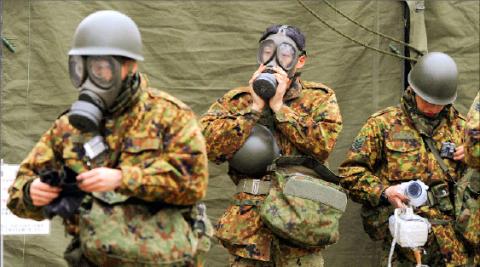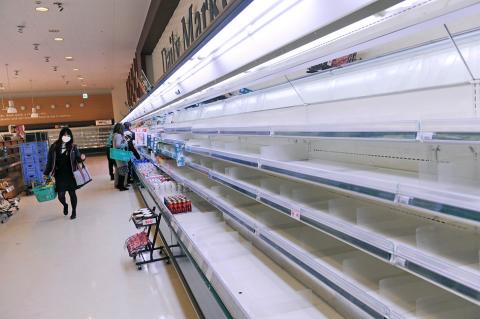|
¡@
Crisis grips Japan as radiation leaks
EXODUS:China said it would begin evacuating Chinese
nationals from quake-stricken areas, while Japan¡¦s prime minister was reportedly
asking ¡¥what the hell is going on¡¦
Reuters, TOKYO
¡@

Self-Defense Force officers prepare for a
clean-up at a radiation-affected area yesterday in Nihonmatsu, Fukushima
Prefecture, Japan.
Photo: Reuters
Japan faced a potential catastrophe yesterday after a quake-crippled nuclear
power plant exploded and sent low levels of radiation floating toward Tokyo,
prompting some people to flee the capital and others to stock up on essential
supplies.
Japanese Prime Minister Naoto Kan urged people within 30km of the facility ¡X a
population of 140,000 ¡X to remain indoors amid the world¡¦s most serious nuclear
accident since the Chernobyl disaster in Ukraine in 1986.
Officials in Tokyo ¡X 240km to the south of the plant ¡X said only minute levels
of radiation had been detected so far in the capital, which were ¡§not a
problem.¡¨
Radiation levels in the city of Maebashi, 100km north of Tokyo, and in Chiba
Prefecture, nearer the city, were up to 10 times normal levels, Kyodo news
agency said. Foreign experts disagreed on whether this was harmful or not.
About eight hours after the explosions, the UN weather agency said winds were
dispersing radioactive material over the Pacific Ocean, away from Japan and
other Asian countries. The Geneva-based World Meteorological Organisation added
that weather conditions could change.
Two of the reactors exploded on Tuesday at the Fukushima Dai-ichi plant after
days of frantic efforts to cool them. Kyodo news agency said the nuclear fuel
pool at the No. 4 reactor might be boiling, suggesting the crisis is far from
over at the plant.
¡§The possibility of further radioactive leakage is heightening,¡¨ a grim-faced
Kan said in an address to the nation. ¡§We are making every effort to prevent the
leak from spreading. I know that people are very worried, but I would like to
ask you to act calmly.¡¨
Levels of 400 millisieverts per hour had been recorded near the No. 4 reactor,
the government said. Exposure to more than 100 millisieverts a year is a level
which can lead to cancer, according to the World Nuclear Association.
The plant operator pulled out 750 workers, leaving just 50, and a 30km no-fly
zone was imposed around the reactors. There have been no detailed updates on
what levels the radiation reached inside the exclusion zone where people live.

A woman (L) walks past empty shelves at a
supermarket in the northwestern city of Akita yesterday as panic buying sweeps
the country following the March 11 earthquake and tsunami.
PHOTO: AFP
¡§Radioactive material will reach Tokyo but it is not harmful to human bodies
because it will be dissipated by the time it gets to Tokyo,¡¨ said Koji Yamazaki,
professor at Hokkaido University graduate school of environmental science. ¡§If
the wind gets stronger, it means the material flies faster, but it will be even
more dispersed in the air.¡¨
Despite pleas for calm, residents rushed to shops in Tokyo to stock up on
supplies. Don Quixote, a multi-storey, 24-hour general store in Roppongi
district, sold out of radios, flashlights, candles and sleeping bags.
In a sign of regional fears about the risk of radiation, China said it would
evacuate its citizens from areas worst affected, but it had detected no abnormal
radiation levels at home. Air China said it had canceled flights to Tokyo.
Several embassies advised staff and citizens to leave affected areas. Tourists
cut short vacations and multinational companies either urged staff to leave or
said they were considering plans to move outside Tokyo.
¡§I¡¦m scared. I¡¦m so scared I would rather be in the eye of a tornado,¡¨ said
10-year-old Lucy Niver of Egan, Minnesota, who was on holiday in Japan. ¡§I want
to leave.¡¨
Japanese media have became more critical of Kan¡¦s handling of the disaster and
criticized the government and nuclear plant operator Tokyo Electric Power Co (TEPCO)
for its failure to provide enough information on the incident.
Kan himself lambasted the operator for taking so long to inform his office about
one of the blasts, demanding to know ¡§what the hell is going on,¡¨ Kyodo
reported.
Kyodo said Kan had ordered TEPCO not to pull employees out of the plant.
¡§The TV reported an explosion, but nothing was said to the premier¡¦s office for
about an hour,¡¨ a Kyodo reporter quoted Kan telling power company executives.
There have been a total of four explosions at the plant since it was damaged in
Friday¡¦s massive quake and tsunami. The most recent were blasts at reactors No.
2 and No. 4.
There was a real possibility of a leak in the No. 4 reactor container, which
houses the nuclear fuel rods, according to Murray Jennex, a professor at San
Diego State University in California.
Concerns center on damage to a part of the reactor core known as the suppression
pool, which helps cool and trap the majority of cesium, iodine and strontium in
its water. The nature of the damage was unclear, as was its impact on the
containment structure, a thick steel vessel that surrounds the core.
The full extent of the destruction from last Friday¡¦s magnitude 9.0 earthquake
and tsunami that followed it was still becoming clear, as rescuers combed
through the region north of Tokyo where officials say at least 10,000 people
were killed.
Whole villages and towns have been wiped off the map by Friday¡¦s wall of water,
triggering an international humanitarian effort of epic proportions.
¡@
|
![]()
![]()
![]()